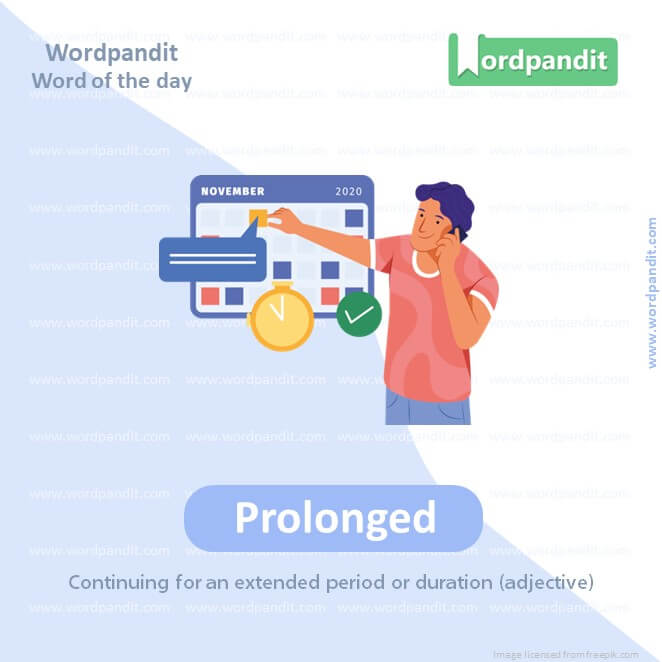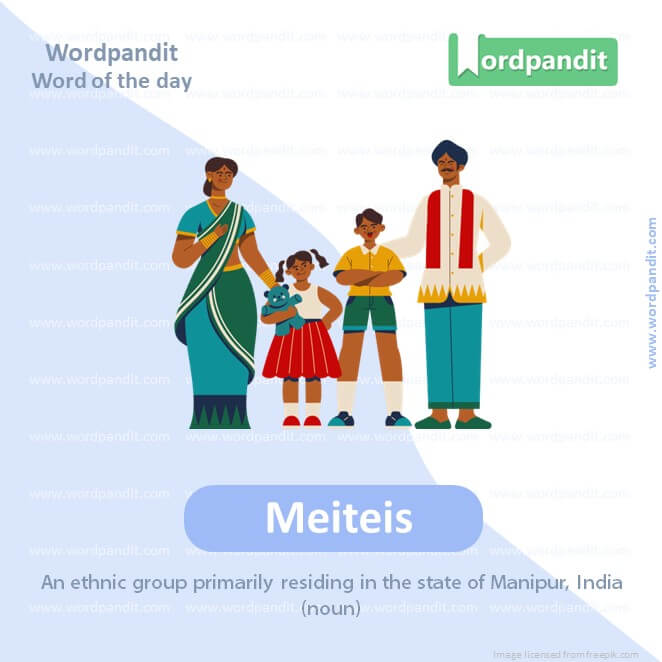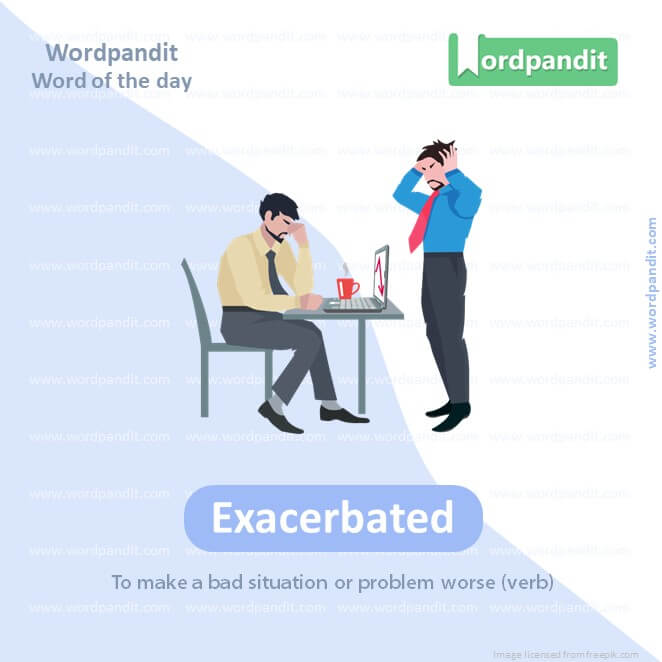Daily Vocabulary Words: List of Daily Used Words
Hi there. Welcome to this special section @ Wordpandit.
Our endeavour here is straightforward: highlighting important daily vocabulary words, you would encounter in The Hindu. This is your repository of commonly used words; essentially, we are posting a list of daily used words. Hence, this has significant practical application as it teaches you words that are commonly used in a leading publication such as The Hindu.
Visit the website daily to learn words from The Hindu.

WORD-1: Partisans
CONTEXT: Every few days there is a violent occurrence or a provocative move from partisans on either side of the conflict
SOURCE: The Hindu
EXPLANATORY PARAGRAPH: Imagine you have a favorite superhero team. You always cheer for them and think they’re the best. That’s kind of like being a partisan. A partisan is someone who really likes a certain group, like a sports team or a political party, and supports them a lot.
MEANING: A person who strongly supports a particular group, cause, or person (noun).
PRONUNCIATION: par-ti-san
SYNONYMS: Supporter, Follower, Fan, Devotee, Enthusiast, Advocate, Backer.
USAGE EXAMPLES:
1. My uncle is a staunch partisan of the local football club.
2. During the debate, she spoke like a true partisan of environmental causes.
3. The town’s partisans gathered to celebrate their team’s victory.
4. He’s known to be a partisan of the new political movement.

WORD-2: Prolonged
CONTEXT: districts dominated by the tribal community, points to yet another hardening of stances that has prolonged the conflict.
SOURCE: The Hindu
EXPLANATORY PARAGRAPH: Think about when you play your favorite game, and you don’t want to stop. So, you keep playing for a really, really long time. That’s what prolonged means – something that lasts for a much longer time than usual.
MEANING: Continuing for an extended period or duration (adjective).
PRONUNCIATION: pro-longed
SYNONYMS: Extended, Lengthy, Long-drawn-out, Protracted, Long-lasting, Drawn-out.
USAGE EXAMPLES:
1. The prolonged game left the players exhausted.
2. There was a prolonged delay before the show started.
3. She took a prolonged vacation to Europe last summer.
4. The city faced a prolonged period of hot weather.

WORD-3: Meiteis
CONTEXT: which has no legal basis, is also bound to enrage Meiteis, especially those whose key grievances include the special land ownership rights to tribals in the State’s hill districts.
SOURCE: The Hindu
EXPLANATORY PARAGRAPH: Meiteis are a group of people who live in a place called Manipur in India. They have their own language, special festivals, and unique ways of living, just like how different families have their own traditions.
MEANING: An ethnic group primarily residing in the state of Manipur, India (noun).
PRONUNCIATION: may-tayz
SYNONYMS: (Specific to the Meitei ethnic group; no direct synonyms)
USAGE EXAMPLES:
1. The Meiteis have a rich cultural heritage.
2. Traditional Meitei dances were performed at the festival.
3. The Meiteis speak a language called Manipuri.
4. He learned about the history of the Meiteis in his class.

WORD-4: Exacerbated
CONTEXT: Fraternal relations between the communities that would facilitate the return of people, even sporadic incidents have exacerbated the situation.
SOURCE: The Hindu
EXPLANATORY PARAGRAPH: Imagine you have a small cut on your hand, and you keep scratching it. The cut gets worse because you didn’t leave it alone. That’s like exacerbating something – making a bad situation or problem even worse.
MEANING: To make a bad situation or problem worse (verb).
PRONUNCIATION: ex-as-er-bay-ted
SYNONYMS: Worsen, Aggravate, Intensify, Amplify, Escalate, Compound.
USAGE EXAMPLES:
1. The heavy rain exacerbated the flooding.
2. Arguing only exacerbated their disagreement.
3. The shortage of supplies exacerbated the crisis.
4. Her neglect of the problem only exacerbated it.

WORD-5: Discreet
CONTEXT: Unless the BJP’s central leadership changes its stubborn strategy of maintaining a discreet silence while using administrative ploys to contain the conflict, the festering in Manipur is bound to continue.
SOURCE: The Hindu
EXPLANATORY PARAGRAPH: Being discreet is like being a quiet mouse that doesn’t make a lot of noise and keeps secrets well. If you’re discreet, you’re good at not drawing attention and not telling others’ secrets.
MEANING: Careful and circumspect in one’s speech or actions, especially to avoid causing offense or gaining attention (adjective).
PRONUNCIATION: dis-creet
SYNONYMS: Prudent, Careful, Cautious, Tactful, Reserved, Diplomatic.
USAGE EXAMPLES:
1. She asked a discreet question about the matter.
2. He was very discreet about his plans.
3. The detective made a discreet entrance.
4. They had a discreet meeting in the coffee shop.
WORD-6: Erupted
CONTEXT: Clashes have erupted in the restive Rakhine State, and Chin State that borders India.
SOURCE: The Hindu
EXPLANATORY PARAGRAPH: Think about a volcano that suddenly starts to throw out lava and smoke. That’s what erupted means – something that bursts out suddenly, like when you might suddenly start laughing really loud.
MEANING: To burst or break out suddenly and dramatically (verb).
PRONUNCIATION: e-rup-ted
SYNONYMS: Exploded, Burst, Blasted, Broke out, Flared up, Ignited.
USAGE EXAMPLES:
1. The volcano erupted last night.
2. A fight erupted in the middle of the game.
3. Cheers erupted from the crowd when the team won.
4. The scandal erupted into a major controversy.
WORD-7: Toppled
CONTEXT: When the military toppled the elected government of Aung San Suu Kyi in February 2021, its first step was to use force to establish order.
SOURCE: The Hindu
EXPLANATORY PARAGRAPH: Imagine building a tower with blocks, and then it falls down. That’s what toppled means. It’s like when something stands up and then falls over or gets knocked down.
MEANING: To fall over or cause to fall over from an upright position (verb).
PRONUNCIATION: top-pled
SYNONYMS: Overturn, Overthrow, Tumble, Collapse, Knock over, Upset.
USAGE EXAMPLES:
1. The strong wind toppled the tree.
2. The statue was toppled during the protest.
3. He accidentally toppled the stack of books.
4. The government was toppled by the rebels.
WORD-8: Repercussions
CONTEXT: the violence continues, especially in areas bordering India and China, it will have regional repercussions.
SOURCE: The Hindu
EXPLANATORY PARAGRAPH: Repercussions are like the ripples you see in water when you throw a stone in. Just like those ripples, repercussions are things that happen because of something else you did, like getting a time-out for not sharing your toys.
MEANING: Consequences or aftereffects of an event or action, especially negative ones (noun).
PRONUNCIATION: ree-per-cush-uns
SYNONYMS: Consequences, Results, Effects, Outcomes, Ramifications, Aftereffects.
USAGE EXAMPLES:
1. The decision had serious repercussions for the business.
2. They were unaware of the repercussions of their actions.
3. The event had far-reaching repercussions.
4. He faced the repercussions of breaking the rule.
WORD-9: Proactive
CONTEXT: Major regional players, along with ASEAN, should play a more proactive role to achieve a ceasefire in Myanmar, setting the stage for meaningful dialogue that is aimed at restoring democracy and freedoms.
SOURCE: The Hindu
EXPLANATORY PARAGRAPH: Being proactive is like being a superhero who solves problems before they get big. It means you don’t wait for things to happen; you do something first to make things better or stop problems from happening.
MEANING: Taking action by causing change and not only reacting to change when it happens (adjective).
PRONUNCIATION: pro-ac-tive
SYNONYMS: Preemptive, Preventative, Anticipatory, Initiative, Forward-thinking, Enterprising.
USAGE EXAMPLES:
1. She was proactive in solving the issue.
2. Taking a proactive approach can prevent many problems.
3. He is known for his proactive leadership style.
4. The company was praised for its proactive response to the crisis.
WORD-10: Confidentiality
CONTEXT: The proceedings focused on arguments pertaining to the voters’ right to information vis-a-vis the right to confidentiality of donors.
SOURCE: The Hindu
EXPLANATORY PARAGRAPH: Confidentiality is like having a secret that you promise not to tell anyone. It’s when you keep information private and don’t share it with people who shouldn’t know it.
MEANING: The state of keeping or being kept secret or private (noun).
PRONUNCIATION: con-fi-den-ti-al-i-ty
SYNONYMS: Privacy, Secrecy, Discretion, Privateness, Secrecy, Non-disclosure.
USAGE EXAMPLES:
1. The lawyer stressed the importance of confidentiality.
2. Patient confidentiality is crucial in medicine.
3. They signed a confidentiality agreement.
4. He violated the confidentiality of the meeting.
vocabulary in use
In the realm of language education, the concept of ‘vocabulary in use’ is exceptionally integral. It refers not merely to the memorization of words, but the practical application of those words within context-rich sentences and conversation. Essentially, ‘vocabulary in use’ stands as the wholesome approach to learning words and phrases the way they are prevalently used in language.
Many language learners stumble upon the roadblock of using vocabulary out of context. Hence, to prevent such linguistic disaster, ‘vocabulary in use’ comes as a rescue. It encourages learners to understand the words, their meanings, nuances, and appropriate application, making language use more authentic and natural.
How should ‘vocabulary in use’ be learned? The efficient approach to this is shifting from the age-old tradition of rote memorization to a modern application-based learning strategy. Put simply, it involves immersing oneself in a language-rich environment. For instance, you may read books, watch series, engage in conversations, or listen to music in your target language. This provides opportunities to encounter ‘vocabulary in use’ in its natural context, which facilitates deeper understanding, recall, and appropriate usage.
Deconstructing the ‘vocabulary in use’ further, learners should focus both on the meaning and usage of new words. Once a learner encounters a new word, they shouldn’t just learn what it means – they should also learn how and when it’s used. This provides an understanding of the contextual and stylistic application of the word.
To conclude, ‘vocabulary in use’ is an anchor point in language learning. This approach goes beyond plain memorization and encourages understanding words in their practical and conversational contexts. A conscious effort to learn ‘vocabulary in use’ can, indeed, enhance linguistic fluency, competency, and overall communication skills. As you journey to language mastery, remember, ‘vocabulary in use’ is your quintessential comrade!













